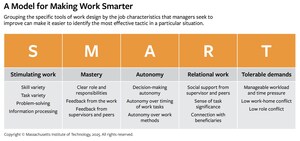CAMBRIDGE, Mass., Jan. 9, 2024 /PRNewswire/ -- MIT Sloan Management Review reveals the insights of more than 500 senior data and technology executives in "Five Key Trends in AI and Data Science for 2024," a part of its AI in Action series.
Artificial intelligence and data science became front-page news in 2023 thanks to generative AI, state coauthors Thomas H. Davenport, the President's Distinguished Professor of Information Technology and Management at Babson College and a fellow of the MIT Initiative on the Digital Economy, and Randy Bean, an industry thought leader who currently serves as innovation fellow, data strategy, for global consultancy Wavestone.
To find out what might keep it on the front page in 2024, Davenport and Bean, during the past several months, conducted three surveys involving more than 500 executives closest to companies' data science and AI strategies to bring to light what organizations are thinking and doing.
"Data science is increasingly critical to every organization. But it's not a static discipline, and organizations need to continually adjust data science skills and processes to get the full value from data, analytics, and AI," said Davenport.
"Expect 2024 to be a year of transformation and change driven by adoption of AI and a reshaping of the data, analytics, and AI leadership role within leading companies," added Bean. "With 33% of midsize to large organizations having appointed or in search of a chief AI officer, and with 83.2% of leading companies having a chief data and analytics officer in place today, it is inevitable that we will witness consolidation of roles, restructuring of responsibilities, elimination of some positions, and some critical rethinking of data and AI leadership expectations during the course of 2024."
"Five Key Trends in AI and Data Science for 2024" culls the surveys to identify developing issues that should be on every leader's radar screen this year:
Generative AI sparkles but needs to deliver value. Survey responses suggest that although excitement is high, the value of generative AI has not been delivered. Large percentages of respondents believe the technology has the potential to be transformational; 80% in one survey said they believe it will transform their organizations, and 64% in another survey said it is the most transformational technology in a generation. A large majority of survey takers are also increasing investment in the technology.
Data science is shifting from artisanal to industrial. Companies are investing in platforms, processes and methodologies, feature stores, machine learning operations (MLOps) systems, and other tools to increase productivity and deployment rates. Automation is helping to increase productivity and enable broader data science participation.
Two versions of data products will dominate. Eighty percent of data and technology leaders in one survey said that their organizations were using or considering the use of data products and product management. But they mean two different things by "data products." Just under half (48%) of respondents said that they include analytics and AI capabilities in the concept of data products. Some 30% view analytics and AI as separate from data products and presumably reserve that term for reusable data assets alone. What matters is that an organization is consistent in how it defines and discusses data products.
Data scientists will become less sexy. The proliferation of roles such as data engineers that can address pieces of the data science problem — along with the rise of citizen data science, where savvy businesspeople create models or algorithms themselves — is causing the star power of data scientists to recede.
Data, analytics, and AI leaders are becoming less independent. In 2023, increasing numbers of organizations cut back on the proliferation of technology and data "chiefs," including chief data and analytics officers (and sometimes chief AI officers). The functions performed by data and analytics executives haven't gone away; rather, they're increasingly being subsumed within a broader set of technology, data, and digital transformation functions managed by a "supertech leader" who usually reports to the CEO. In 2024, expect to see more of these overarching tech leaders who have all the capabilities to create value from the data and technology professionals reporting to them.
The MIT Sloan Management Review article "Five Key Trends in AI and Data Science for 2024" publishes at 8 a.m. ET on Jan. 9, 2024. This column is part of the series AI in Action.
About the Authors
Thomas H. Davenport is the President's Distinguished Professor of Information Technology and Management at Babson College, a fellow of the MIT Initiative on the Digital Economy, and senior adviser to the Deloitte Chief Data and Analytics Officer Program. He is coauthor of All-In On AI: How Smart Companies Win Big With Artificial Intelligence (HBR Press, 2023) and Working With AI: Real Stories of Human-Machine Collaboration (MIT Press, 2022). Randy Bean is an industry thought leader, author, founder, and CEO and currently serves as innovation fellow, data strategy, for global consultancy Wavestone. He is the author of Fail Fast, Learn Faster: Lessons in Data-Driven Leadership in an Age of Disruption, Big Data, and AI (Wiley, 2021).
About MIT Sloan Management Review
MIT Sloan Management Review is an independent, research-based magazine and digital platform for business leaders published at the MIT Sloan School of Management. MIT SMR explores how leadership and management are transforming in a disruptive world. We help thoughtful leaders capture the exciting opportunities — and face down the challenges — created as technological, societal, and environmental forces reshape how organizations operate, compete, and create value.
Connect with MIT Sloan Management Review on:
Tess Woods
[email protected]
617-942-0336
SOURCE MIT Sloan Management Review

WANT YOUR COMPANY'S NEWS FEATURED ON PRNEWSWIRE.COM?
Newsrooms &
Influencers
Digital Media
Outlets
Journalists
Opted In





Share this article